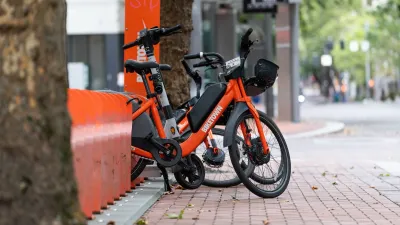After years of signaling its intent, it appears as though the City of Portland is getting serious about ditching its auto-centric level-of-service (LOS) metric with one that evaluates multiple modes, reports Jonathan Maus.
Last week the City of Portland issued a request for proposals [PDF] for a consultant to update the city's transportation performance standards. Why is this significant? Like most cities around the country, Portland is burdened by performance standards that rely on an automobile-oriented level-of-service evaluation as the basis for, "determining the adequacy of transportation services in
development review applications and volume-to- capacity (v/c) measures
that are used in project and system planning."
According to the RFP, "The existing LOS standards and measures, which focus only on
motor vehicle levels of service, do not reflect the City of Portland's
current practice which emphasizes and promotes a multimodal approach to
transportation planning and providing transportation services." And with the city seeking to encourage alternative modes in its transportation policies and land use decisions, the current standards have become an obstacle.
So after years of "grumblings" about the need for this momentous policy change, why is it being undertaken now? Maus believe the reason is, "because the City is beginning the
process of updating the Comprehensive Plan and the Transportation System
Plan (TSP) which lives within it."
"The RFP deadline is August 17th and work on the $100,000 project is expected to proceed by mid-September."
FULL STORY: City of Portland looks to go beyond auto-centric 'level of service' standards

Alabama: Trump Terminates Settlements for Black Communities Harmed By Raw Sewage
Trump deemed the landmark civil rights agreement “illegal DEI and environmental justice policy.”

Study: Maui’s Plan to Convert Vacation Rentals to Long-Term Housing Could Cause Nearly $1 Billion Economic Loss
The plan would reduce visitor accommodation by 25% resulting in 1,900 jobs lost.

Planetizen Federal Action Tracker
A weekly monitor of how Trump’s orders and actions are impacting planners and planning in America.

Wind Energy on the Rise Despite Federal Policy Reversal
The Trump administration is revoking federal support for renewable energy, but demand for new projects continues unabated.

Passengers Flock to Caltrain After Electrification
The new electric trains are running faster and more reliably, leading to strong ridership growth on the Bay Area rail system.

Texas Churches Rally Behind ‘Yes in God’s Back Yard’ Legislation
Religious leaders want the state to reduce zoning regulations to streamline leasing church-owned land to housing developers.
Urban Design for Planners 1: Software Tools
This six-course series explores essential urban design concepts using open source software and equips planners with the tools they need to participate fully in the urban design process.
Planning for Universal Design
Learn the tools for implementing Universal Design in planning regulations.
Caltrans
Smith Gee Studio
Institute for Housing and Urban Development Studies (IHS)
City of Grandview
Harvard GSD Executive Education
Toledo-Lucas County Plan Commissions
Salt Lake City
NYU Wagner Graduate School of Public Service





























